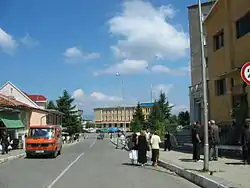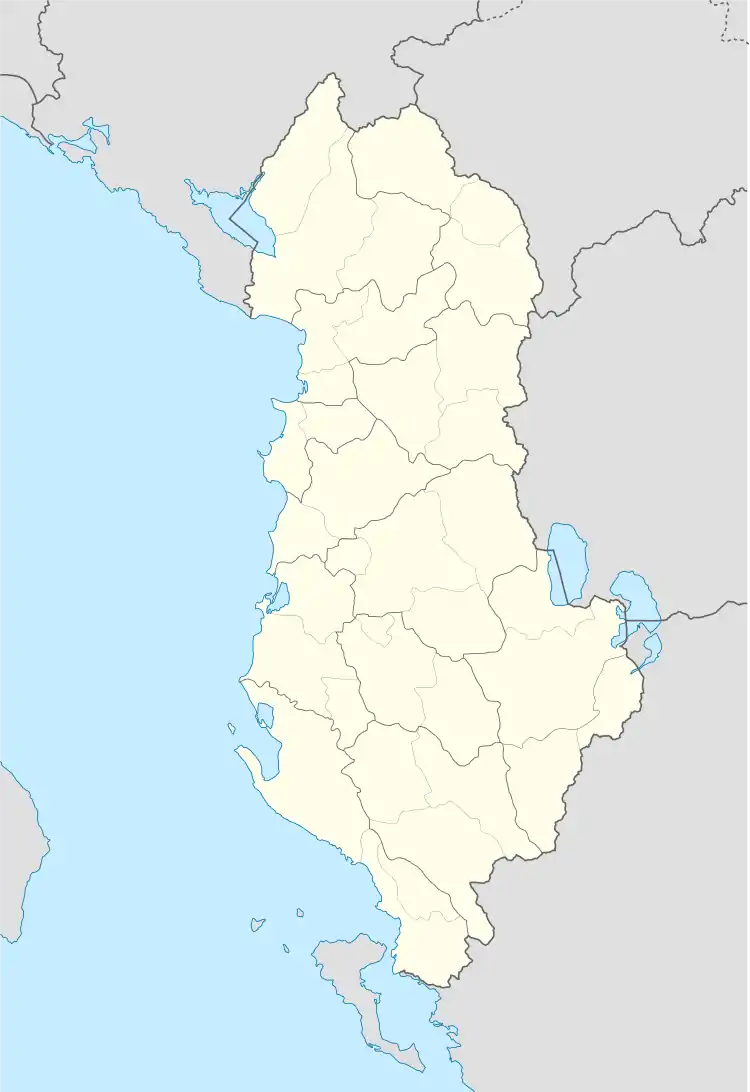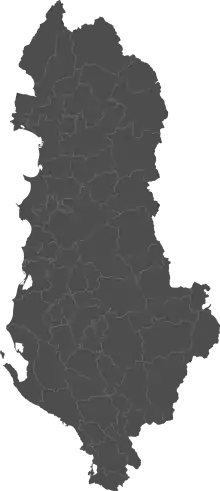Pukë
Pukë (definite Albanian form: Puka) is a town and municipality in northern Albania. It was formed at the 2015 local government reform by the merger of the former municipalities Gjegjan, Pukë, Qelëz, Qerret and Rrapë, that became municipal units. The seat of the municipality is the town Pukë.[1] The total population is 11,069 (2011 census),[2] in a total area of 505.83 km2.[3] The population of the former municipality at the 2011 census was 3,607.[2] The local football club is called KS Tërbuni Pukë.
Pukë | |
|---|---|
 City Center of Pukë | |
 Emblem | |
 Pukë | |
| Coordinates: 42°03′N 19°54′E | |
| Country | |
| County | Shkodër |
| Government | |
| • Mayor | Gjon Gjonaj (PS) |
| Area | |
| • Municipality | 505.83 km2 (195.30 sq mi) |
| Elevation | 890 m (2,920 ft) |
| Population (2011) | |
| • Municipality | 11,069 |
| • Municipality density | 22/km2 (57/sq mi) |
| • Municipal unit | 3,607 |
| Time zone | UTC+1 (CET) |
| • Summer (DST) | UTC+2 (CEST) |
| Postal Code | 4401 |
| Area Code | (0)212 |
| Website | Official Website |
At 838 metres above sea level, the town is one of the highest in elevation in Albania and a well-known ski area. It is 150 km from Albania's capital, Tirana.
History
In the 20th century, Pukë was expanded as a military base and a centre of Catholic education. The distinguished Albanian poet Migjeni worked there from 1936 to 1937. The school where he worked as a teacher is a tourist attraction. The town is surrounded by a 400-hectare (1.5 sq mi) massif covered with pine trees. Since the end of the communist era, there has been a spread of disease in the pines caused by pine processionary moths, whose nests are conspicuous.
Anthropology
The settlement is inhabited by the tribe of Puka,[4] itself one of the "seven tribes of Puka" (Albanian: shtatë bajrakët e Pukës).[5] According to tradition, collected by Hyacinthe Hecquard in the mid-19th century, the settlement of Puka had been founded by a Paolo Zenta, who according to Marin Barletius was a relative of Lekë Dukagjini.[4]
The region also has its own Kanun, a set of traditional Albanian laws and is known as Kanuni i Pukës (English: Canon of Pukë) and used mainly in Northern Albania and Kosovo.
The toponym may derive from Latin via publica ("public road") as it was located on an old trade route.[5]
Economy
The hotel standing in the town square has been upgraded and now boasts a microbrewery producing Puka Beer, which is a lager in draught form.
Mayors
| No. | Name | Term in office | |
| 1 | Halit Topalli | 1992-1996 | |
| 2 | Halit Furriku | 1996-2000 | |
| 3 | Ndue Cara | 2000-2003 | |
| 4 | Rrustem Strugaj | 2003-2011 | |
| 5 | Beqir Arifaj | 2011-2015 | |
| 6 | Gjon Gjonaj | 2015 (Incumbent) | |
Notable people
- Etilda Gjonaj - Albanian politician, lawyer, and professor. She is currently the Minister of Justice of Albania
- Altin Lala - Former captain of Albania national football team and Hannover 96
- Kristjan Sokoli - NFL player
- West Cenaj - footballer
- Xhovalin Delia - Painter
- Fabio Gjonikaj - footballer
- Taulant Marku - footballer
- Sebino Plaku - footballer
- Flavio Prendi - footballer
- Shtjefën Gjeçovi - Catholic priest, folklorist and the collector and writer of Kanuni i Lekë Dukagjinit/Kanun (Albania)
- Ndoc Mark Gega - Patriot
- Millosh Gjergj Nikolla - Teacher, poet and writer
See also
References
- Law nr. 115/2014 Archived 2015-09-24 at the Wayback Machine
- "Population and housing census - Shkodër 2011" (PDF). INSTAT. Retrieved 2019-09-25.
- "Correspondence table LAU – NUTS 2016, EU-28 and EFTA / available Candidate Countries" (XLS). Eurostat. Retrieved 2019-09-25.
- Elsie 2015, p. 179.
- Elsie 2015, p. 178.
Sources
- Elsie, Robert (2015). The Tribes of Albania: History, Society and Culture. I.B.Tauris. ISBN 978-1-78453-401-1.
- Through The Embers of Chaos ISBN 0-7195-6232-5 (2002), Dervla Murphy
The author refers to processionary disease in Pukë on a cycle trip through Albania, including a stay in the town, described on page 213
External links
| Wikimedia Commons has media related to Pukë. |
- Official website
- Hotel Turizem Puka Official Website
- Pukë A Web page dedicated to Pukë and the surrounding area
- Puka Tourist Guide


